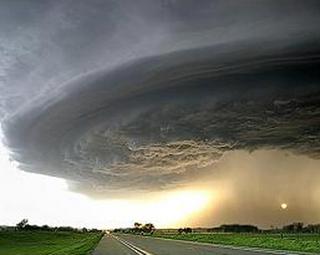By now we all know about the bailout of the robber barons who brought death into this world and all our woe. They and the government – which are looking more and more like a single entity – are being rewarded beyond any of their wildest dreams for their staggering failure and incompetence while we are being asked to pay. I really don’t think the ramifications are clear to most people: we are giving the Treasury Department free reign to do anything it likes with as much money as they want, with no oversight or accountability.
You’ll find in the bailout plan this hair-raising gem:
Decisions by the Secretary pursuant to the authority of this Act are non-reviewable and committed to agency discretion, and may not be reviewed by any court of law or any administrative agency.
You have to read that a few times. This verges on the totalitarian. There will be a semi-annual review by a congressional committee with no power of enforcement, and that’s it. We are giving the Treasury Department everything, on faith, despite the economic maelstrom they themselves helped to create. It is wholly unprecedented and looks like it will go into effect with little or no debate, in the Patriot Act tradition. Krugman asks some simple questions: Does the public have no say in this matter? Are we not owed an explanation about how this will work? No answers yet.
Meanwhile, what about the rest of the nation’s needs? How do we fight a two-front war and provide services as usual and hand the thieves a trillion dollars or more? What about the effect of increasing the national debt and flooding the system with dollars? No one seems to be going there, at least not in the US media. Remember what happened in Germany in the 1920s?
From one of my favorite commentators:
Today’s reported potential infinite bailout of all and any portends, if adopted, is the largest increase in dollars outstanding since the Jurassic Age. It closely models actions undertaken regarding the production of currency liquidity seen in the Weimar Republic….
The only conclusion is that when the smoke clears and the advertised actions have been adopted, nothing more dollar negative than this has ever occurred due to the potential expansion of T bills and therefore dollar supply explosion.
The Times of London raised the question but no one seems to be particularly worried about it. Perhaps we should be.
THE US Treasury’s $700 billion (£380 billion) plan to bail out the banks could undermine the dollar, economists warn. The plan, details of which were unveiled yesterday, will seek congressional approval to raise the total amount the US government can borrow from $10.6 trillion to $11.3 trillion.
It also gives Hank Paulson, the US Treasury secretary, immunity from legal challenge under the plan. The US Treasury will buy mortgage-related securities “from any financial institution having its headquarters in the United States”, draft legislation said. Securities issued before September 17 will be eligible for inclusion.
Word of the proposals created a mood of euphoria in financial markets on Friday. But analysts warned of the risks.
Tim Bond of Barclays Capital, while conceding that the rescue was necessary to avoid the risk of depression, said: “The volume of fresh government borrowing and the fast expansion of the Fed’s balance sheet are both negatives for the dollar, carrying a potential risk of increased inflation.”
Other economists also think that the dollar could be undermined. Kenneth Rogoff, former chief economist at the International Monetary Fund and now a professor at Harvard, said: “It is hard to believe that the dollar will continue to stand its ground as the crisis continues to deepen.”
At this point, would McCain or Obama or Palin or Clinton make a difference? Hard to say. If it were up to me, Obama wouldn’t be my first choice. His ties to Wall Street may be as worrisome as McCain’s ties to the deregulation architects. However, the very distinct possibility of a Palin presidency tips the scales in Obama’s favor. Drastically. Maybe on election day it will all boil down to the lesser of two evils (which most elections usually are anyway). And I think it’s pretty easy to determine which is the greater and which is the lesser.


Comments